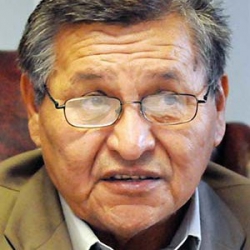The New Mexico Senate approved a tribal gaming compact on Wednesday which allows Native American casinos to continue operating beyond June 2015. The tribes affected by the vote include the Navajo Nation, Mescalero Apache, the the Jicarilla Apache, and the Acoma Pueblo tribes.
The Senate approved the measure in a 35-7 vote. The bill now goes before the New Mexico House of Representatives. If it passes in the House, the compact would need to be signed by the New Mexico governor.
Ben Shelly Spoke to Legislature
Ben Shelly, the President of the Navajo Nation, spoke in Santa Fe to New Mexico’s lawmakers about the importance of a proposed gambling company. Shelly stressed the importance of approving the gambling compact to the lawmakers.
The comments were made during a Monday session of the New Mexico Legislature. He asked for the compact to be approved before the session adjourned on March 21.
Lengthy Negotiations
In June 2015, previous compacts signed by the Navajo and several other tribes in the state are set to expire. To continue operating their casinos legally, the compact needed to be approved by the New Jersey state legislature. Now, the U.S. Department of the Interior will need to approve the compact.
The gaming compact was signed after a long and contentious negotiation between the tribal gaming interests and the administration of Governor Suzana Martinez. Those negotiations began 3 years ago and have had many twists and turns. The two sides were involved in litigation during the negotiations, while officials on either side of the dispute made inflammatory comments. To gain approval in the senate, both sides drew closer together, hoping to convince legislators to approve their plan.
Cisneros on the Art of Negotiation
Sen. Carlos Cisneros, a Democrat from the Questa area, discussed the hard negotiations. Cisneros said, “Certainly the art of good negotiation is the ability to make concessions….Clearly, not everybody is happy, but that’s just the way it is. In real life, we tend to understand that when you negotiate a contract, there’s going to be give and take.”
Sanchez on the State’s Expected Revenues
Sen. Clemente Sanchez, the Chairman of the Compacts Committee and a Democrat from the Grants area, said the new compact will give the state more revenues per year over the next 2 decades than were handed over in the previous compact.
Casinos in the state collected $731 million in net winnings in 2014. Net winnings include the amount wagered minus the prizes paid out. About 70% came from the slot machines.
Compact Helps Jobs Retention
Of that money, about $66 million went to the state in tax revenues. Under the new plan, the state should collect closer to $77 million per year. In his comments on Monday, Ben Shelly discussed how the plan was good for the thousands of jobs in the state’s gaming industry. The Associated Press printed a quote from KRQE News 13, stating the new gaming company “would bring stability to New Mexico’s gambling industry, protect jobs and increase revenues to the state“.
Federal Law and Gaming Compacts
The tribal-state gaming compacts are regulated by the The Indian Gaming Regulatory Act, a federal law passed in 1988 in response to the landmark California v. Cabazon Band of Mission Indians, which was decided before the US Supreme Court in 1987. In the Cabazon Band case, the Supreme Court ruled the Native American tribes were sovereign nations, because the US government had signed 19th century treaties which recognized their sovereign rights. For that reason, state anti-gambling laws did not apply to the reservations found inside those states.
The Supreme Court ruled that states and tribes had to come to arrangements for the Tribal authorities to develop casinos there, but the tribes had the right to do so. That allows the states to negotiate tax revenues and set up regulatory oversight, while at the same time maintaining only a very limited form of legalized gambling. The federal regulator is the The National Indian Gaming Commission, which is a division of the US Department of the Interior. The Interior Department has handled federal-tribal affairs since the time of the Old West, because Indian reservations were considered to be internal matters of the United States’ territories.
After the Navajo gaming compact is ratified by the New Mexico House of Representatives, the US Interior Department will need to give its approval.

